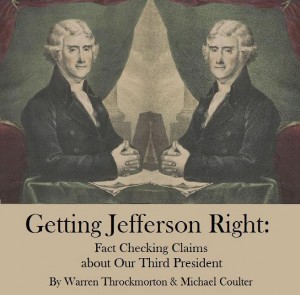In the 2012 edition of The Jefferson Lies, David Barton claimed to debunk the notion that the University of Virginia (founded by Jefferson) had no chaplains. He took up this as one of his major points as evidence that Jefferson established UVA as a “transdenominational” college. See below from the first edition of The Jefferson Lies:
4. Did the University of Virginia Have Chaplains?
The modern claim that the University of Virginia had no chaplains is also easily disproved by original documents, including early newspaper ads that the university ran to recruit students from surround-ing areas. In the Washington newspaper the Globe, the Reverend Septimus Tuston (identified in the ad as the chaplain of the university and who later became the chaplain of the US House of Representatives and then the US Senate) discussed religious life at the school, reporting:
Barton, David (2013-02-15). The Jefferson Lies: Exposing the Myths You’ve Always Believed About Thomas Jefferson (Kindle Locations 1330-1335). WallBuilder Press. Kindle Edition.
Barton then cited a 1837 article from the Washington Globe. Jefferson died in 1826; he had nothing to do with chaplains at UVA. Perhaps anticipating this counterpoint to his argument, Barton crafted a narrative to try to explain why chaplains were not appointed in the early days of the school. However, what Barton does to James Madison (who took over when Jefferson died) demonstrates his bias. From the first edition of The Jefferson Lies, Barton selectively quoted Madison:
The University of Virginia did indeed have chaplains, albeit not in its first three years (the university opened for students in 1825). At the beginning, when the university was establishing its reputation as a transdenominational university, the school had no appointed chaplain for the same reason that there had been no clergyman as president and no single professor of divinity: an ordained clergyman in any of those three positions might send an incorrect signal that the university was aligned with a specific denomination. But by 1829, when the nondenominational reputation of the university had been fully established, President Madison (who became rector of the university after Jefferson’s death in 1826) announced “that [permanent] provision for religious instruction and observance among the students would be made by . . . services of clergymen.”
Barton, David (2013-02-15). The Jefferson Lies: Exposing the Myths You’ve Always Believed About Thomas Jefferson (Kindle Locations 1362-1369). WallBuilder Press. Kindle Edition.
This treatment of Madison completely changes Madison’s meaning. Actually these words from Madison comes from a letter he wrote to a fellow university trustee. Here is what Barton cited Madison as saying:
“that [permanent] provision for religious instruction and observance among the students would be made by…services of clergymen.”
However, Madison made no public announcement about UVA policy. Instead, Madison wrote those words in a May 1, 1828 letter to Chapman Johnson, one of the members of the university Board of Visitors. The actual quote depicts a completely different meaning than Barton implies. Here is the entire section of the letter, from which Barton lifts his quote. Barton leaves out the words from Madison which are required to understand the meaning. Another unwarranted change Barton makes is to add the word “permanent.” What Barton omitted is in bold print below:
I have indulged more particularly the hope, that provision for religious instruction and observances among the Students, would be made by themselves or their Parents & Guardians, each contributing to a fund to be applied, in remunerating the services of Clergymen, of denominations, corresponding with the preference of the contributors. Small contributions would suffice, and the arrangement would become more & more efficient & adequate, as the Students become more numerous; whilst being altogether voluntary, it would interfere neither with the characteristic peculiarity of the University, the consecrated principle of the law, nor the spirit of the Country.
Instead of securing chaplains, Madison hoped that the students and parents would handle the religious matters themselves voluntarily.
In the new edition of The Jefferson Lies, Barton continues to assert that Jefferson wanted to establish a “transdenominational” school but he leaves out the chaplains story. From the new edition:
4. DID JEFFERSON EXCLUDE RELIGIOUS INSTRUCTION FROM THE ACADEMIC PROGRAM?
As already noted, in 1818 Jefferson and the university Visitors publicly released their plan for the new school announcing that it would be transdenominational and making clear that religious instruction would be provided to all students. But Jefferson insisted on additional steps to ensure that religious training would occur at the university.
Barton, David (2015-12-22). The Jefferson Lies: Exposing the Myths You’ve Always Believed About Thomas Jefferson (Kindle Locations 1997-2000). WND Books. Kindle Edition.
I am surprised that Barton left this story out because in February 2015, Barton told the same story to Jack Hibbs, pastor of Calvary Chapel Chino Hills. He told this story as evidence that he is positively revising errors of academic historians. Watch:
There is no actual academic debate over the eventual presence of chaplains at UVA. Barton’s narrative seems designed to make him look like he is revising history in the direction of accuracy. However, when you know the rest of the story, it is easy to see who engaged in revision.

Barton has taken the position that Michael Coulter and I are mostly wrong in our critique of The Jefferson Lies. However, in this case, our accurate telling of the story apparently resulted in a significant alteration in his book. Instead of acknowledging this, Barton and World Net Daily are doubling down on the false narrative that the first edition was killed due to liberal attacks.